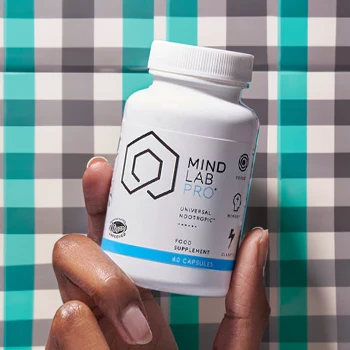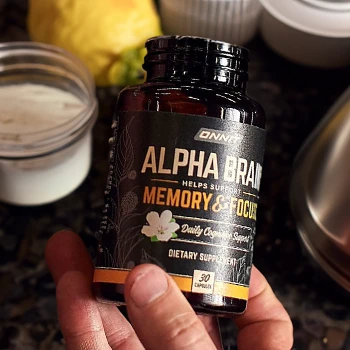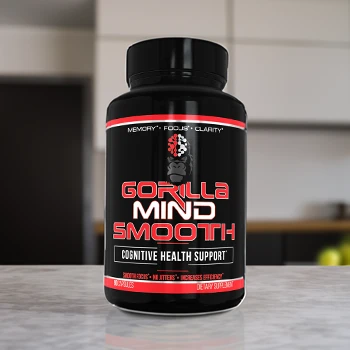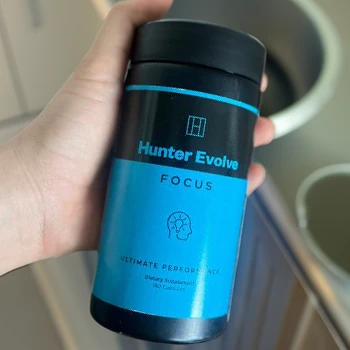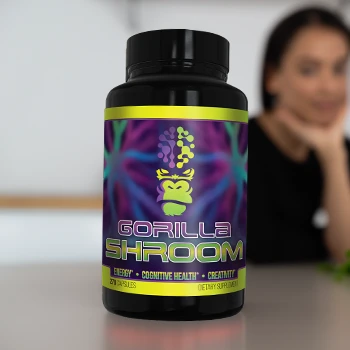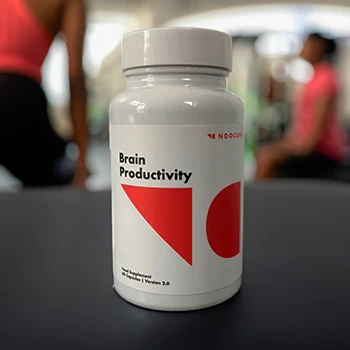People mistakenly believe that attention deficit hyperactivity disorder only affects children.
But there are many adults that can struggle with everyday tasks because of such a brain health issue.
Fortunately, there are nootropic supplements that can help with all sorts of challenges with cognitive performance.
To find out which ones work best, I teamed up with 13 clients, a dietitian, and a doctor to test and research dozens of nootropics over an eight-week period.
We’ve gathered professional and client feedback on the best nootropics for ADHD and healthy brain function, so let’s dive in.
The Best Nootropics For ADHD
- Best Overall Nootropics for ADHD: Mind Lab Pro
- Cheapest Nootropics for ADHD: Primal Harvest
- Best Nootropic for ADHD and Focus: Onnit Alpha Brain
- Best Long-Lasting Nootropic for ADHD: Gorilla Mind Smooth
- Best Calming Nootropic for ADHD: Hunter Focus
- Best Herbal Nootropic for ADHD: Gorilla Shroom
- Best Memory-Enhancing Nootropic for ADHD: NooCube
Our Top Nootropics For Treating ADHD (April 2024)
1 - Mind Lab Pro (Best Overall)
- Vitamin B6 : 2.5 mg
- Rhodiola Rosea : 50 mg
- Lion’s Mane Mushroom : 500 mg
- Maritime Pine Bark Extract : 75 mg
Pros and Cons
Pros
- Has a calming effect on the mind to reduce stress
- Effectively focuses your brain on one task at a time with fewer distractions
- There are no stimulants to make you jittery
- The capsules are easy to swallow for more flexibility when you take them
Cons
- Only for sale on the official website, with no store purchase options available
Having struggled with ADHD symptoms myself, I was skeptical but hopeful when trying Mind Lab Pro. To my surprise, the clarity and focus it provided were undeniable. It felt like a veil lifted, and tasks that once seemed insurmountable became manageable.
It seems to strike a great balance between having the right ingredients for calming down your mind and keeping you laser-focused on a task.
Rhodiola Rosea is the ingredient that could be contributing the most, as a study from the National Institute of Health (NIH) has shown that it can impact adults with ADHD in a positive way [1].
My doctor also highlighted that it has the best combination of proven ingredients out of all the nootropics we tested.
Quick Facts:
2 - Onnit Alpha Brain (Best for Focus)
- Alpha GPC : n/a
- Vitamin B6 : 10 mg
- L-Theanine : n/a
- Cat’s Claw Extract : 350 mg
Pros and Cons
Pros
- Good selection of scientifically proven ingredients for focus and motivation
- Positive feedback about the impact on reduced stress and improved mood
- You can easily spread out the capsules over the day to get a long-lasting effect
Cons
- The nootropic has a partially proprietary formula making stacking more difficult
I remember the first time I tried Onnit Alpha Brain; the enhanced neural activity was palpable. My thoughts were clearer, and the usual brain fog that clouded my daily life with ADHD was noticeably absent.
And with that improved neural activity comes a significant benefit for your overall focus, as our testers have revealed.
A doctor I spoke with highlighted that L-Theanine has been linked to reduced mental fatigue allowing you to stay more focused on complex tasks [2].
The main reason we bumped it down to the second spot is due to a partially proprietary formula that makes it difficult to stack.
Check out our full Onnit Alpha Brain review here.
Quick Facts:
3 - Gorilla Mind Smooth (Best Long-Lasting)
- Ginkgo Biloba : 180 mg
- Kanna : 250 mg
- L-Tyrosine : 750 mg
- Alpha GPC : 600 mg
Pros and Cons
Pros
- Stimulant-free nootropic helps to boost focus and motivation
- Can also help with anxiety symptoms to calm the mind
- Long-lasting effects up to eight hours
Cons
- You’ll have to set reminders to take the full six capsules throughout the day
I was already a fan of Gorilla Mind’s products, but the Smooth nootropic was a game-changer for me. Living with ADHD, the struggle for focus is real, but this supplement made my thoughts less chaotic and more streamlined.
It’s stimulant-free, so it won’t make you jittery, and the boosted brain function and concentration feel completely natural.
A doctor I spoke with highlighted that the good dose of Ginkgo Biloba is probably the main reason for this.
According to NIH, this herbal extract has been linked to improvements in ADHD [3].
Just keep in mind that the full dose will require taking six capsules a day.
Take a look at our full review of Gorilla Mind Smooth to learn more.
Quick Facts:
4 - Hunter Focus (Best Calming)
- Vitamin B6 : 2.5 mg
- Ginkgo Biloba : 120 mg
- Rhodiola Rosea : 50 mg
- L-Carnitine : 800 mg
Pros and Cons
Pros
- Good effects on mental focus and motivation to work on one task at a time
- Proven to reduce stress levels in social situations that may cause anxiety
- It’s easy to adjust the dose to the level you need to feel less distracted
Cons
- Some people have reported that they find the capsules a little bit large to swallow
As someone who has tried various solutions for my ADHD, Hunter Focus stood out. The calmness and focus it instilled weren’t just noticeable to me but to those around me. Tasks that typically would have me bouncing off the walls were completed with a newfound serenity.
With the main goal of this supplement being the focus, it can be the ideal one for treating ADHD symptoms.
And we also saw in test results that users experienced decreased levels of stress when they struggled with certain social situations [4].
Quick Facts:
5 - Gorilla Shroom (Best Herbal)
- Vitamin B6 : 10 mg
- Ashwagandha : 500 mg
- Lion’s Mane Mushroom : 1,500 mg
- Yerba Mate Extract : 200 mg
Pros and Cons
Pros
- Good feedback from people who found it helped to remain focused throughout the day
- Also helps to relieve symptoms of stress
- Strong dose of vitamin B6 boosts blood flow and energy for the brain
Cons
- It’s only available on the official website and not in stores at the moment
The next one of our best nootropics for ADHD is Gorilla Shroom, which is an excellent brand in the nootropic space.
You can easily stack with some of the company’s other products for brain health, and we got good test results for improved focus.
This is mainly down to a good dose of Lion’s Mane mushroom, which, according to NIH, has been proven to help with motivation and mental focus [5].
Quick Facts:
6 - NooCube (Best Memory-Enhancing)
- Cat’s Claw Extract : 175 mg
- L-Tyrosine : 250 mg
- Bacopa Monnieri : 250 mg
- Oat Straw : 150 mg
Pros and Cons
Pros
- Works well as a mild ADHD treatment with good focus improvements
- Reduces stress levels to improve brain health
- Positive feedback on benefits of working memory
Cons
- Not all of the ingredients have proven benefits for overall cognitive function
NooCube is another good supplement for anyone with mild ADHD symptoms.
Our testers all commented on improvements in their ability to stay focused and cognitive benefits for short and long-term memory.
It also contains a naturally occurring amino acid called L-Tyrosine, which studies have shown to have an impact on limited cognitive decline and reduce cortisol [6].
And with lower levels of stress, it can have a positive effect on dopamine levels and general brain function.
Quick Facts:
7 - Qualia Mind

- Rhodiola Rosea : 300 mg
- Pantothenic Acid : 50 mg
- Alpha GPC : 200 mg
- Acetyl-L-Carnitine HCI : 500 mg
Pros and Cons
Pros
- Good results reported on the impact of lower stress and anxiety
- Provides improved working memory and focus
- It can reduce brain fog and boost dopamine without stimulants
Cons
- It’s often out of stock in most online stores
What we liked about Qualia Mind is that a few of our testers with attention deficit disorder also highlighted that it helped them to lift brain fog first thing in the morning without needing stimulants like caffeine that could negatively affect the ADHD treatment.
The main reason that it can improve focus and memory is down to the alpha-glycerylphosphorylcholine (GPC), which studies have proven to link to overall cognitive function [7].
One thing to keep in mind is that it’s often out of stock online, so if you like the effects of this nootropic, then make sure you order enough to keep you going.
Quick Facts:
8 - Leading Edge Health - BRAINPILL
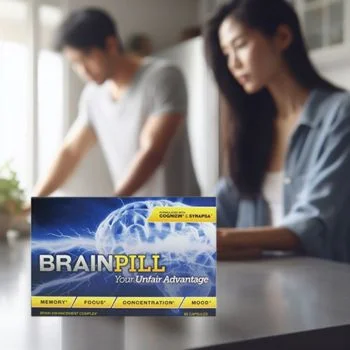
- Vitamin B6 : 5 mg
- L-Tyrosine : 175 mg
- Ginkgo Biloba : 100 mg
- Vitamin B12 : 50 mcg
Pros and Cons
Pros
- Positive feedback that it helps with solving complex problems
- Contains good ingredients for reduced stress and anxiety
- It will improve focus and help drown out common distractions
Cons
- You might need to get used to swallowing large capsules
Brainpill is certainly a clever name for a nootropic, but it can back up that name with good ingredients for treating ADHD symptoms.
Our testing data shows that it helped boost brain function to the extent that it helps both with problem-solving skills and remaining focused.
My dietitian also noted that it has a good dose of B vitamins that have a proven effect on improving blood flow to the brain [8].
And that means more oxygen, energy, and nutrients for the brain to process.
Quick Facts:
9 - Life Extension Cognitex Elite
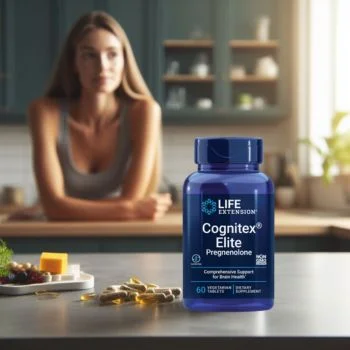
- Blueberry Extract : 200 mg
- Ashwagandha : 200 mg
- Phosphatidylserine : 125 mg
- Pregnenolone : 50 mg
Pros and Cons
Pros
- Specifically formulated to help the brain stay focused on one task at a time
- Contains pregnenolone for improved neurotransmitter synthesis
- Comes in small enough tablets that are easy to swallow
Cons
- It’s quite an expensive nootropic compared to other options
This is another supplement that has provided our testing team with solid results for cognitive enhancement and overall brain energy.
They reported fewer distractions and more impulse control while trying to focus on one task.
My doctor highlighted one ingredient as particularly interesting.
Pregnenolone has been shown in a randomized controlled trial to have a positive impact on neuroplasticity [9].
That means it can help to improve connections between brain cells like many prescription smart drugs do.
Quick Facts:
10 - Moon Juice - Brain Dust
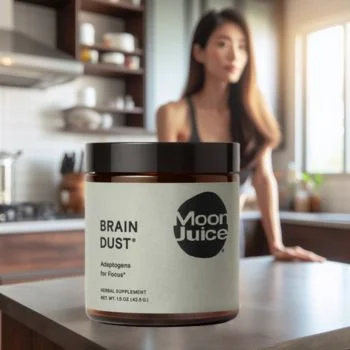
- Lion’s Mane Mushroom : n/a
- Organic Maca Root : n/a
- Ashwagandha : n/a
- Ginkgo Leaf : n/a
Pros and Cons
Pros
- Based on herbs and mushrooms with proven impacts on an ADHD brain
- The powder mixes easily with tea, coffee, or a smoothie
- Gluten-free and vegan-friendly option
Cons
- The company hides behind a proprietary label that makes a nootropic stack difficult
Our testing data on Moon Juice also revealed positive impacts on ADHD symptoms, with significantly improved mental performance for memory and focus without distractions.
My dietitian pointed me to an interesting study on Ginkgo leaf extract that highlighted this herb as one of the most effective traditional ADHD treatments [10].
I should also mention that it’s possibly the best option for vegans and people with gluten intolerance.
Quick Facts:
11 - Primal Harvest - Primal Mind Fuel (Cheapest Option)

- Vitamin B6 : 10 mg
- Caffeine : n/a
- L-Tyrosine : n/a
- Theobromine : n/a
Pros and Cons
Pros
- Provides a good boost in brain power and reduces mental fatigue
- Good benefits for better memory and concentration levels
- Also seems to trigger a dopamine release for improved mood
Cons
- The company lists a proprietary blend that makes stacking nootropics difficult
The next one of our recommended ADHD nootropics is from Primal Harvest, and our testing data shows that it has a good impact on brain performance with solid improvements for memory and concentration.
We also found that it has a great impact on mood levels.
And this is likely due to the combination of caffeine and theobromine, which studies have shown to positively impact mood and alertness [11].
It’s just a shame that the company hides behind a proprietary blend, which would make it difficult to stack with other nootropics.
Quick Facts:
12 - Mindhoney - Dose

- L-Theanine : n/a
- Ashwagandha : n/a
- Bacopa Monnieri : n/a
- Lion’s Mane Mushroom : n/a
Pros and Cons
Pros
- Can improve focus and motivation for work and study tasks
- Doesn’t contain stimulants that might cause jitters and distraction
- Great overall mental performance as it can help get you into flow
Cons
- Difficult to stack it with other nootropics due to a proprietary label
The final one of our best nootropics to help treat ADHD is Mindhoney, and this has a good combination of proven herbs to help you maintain focus for longer.
One of the most effective ingredients in this nootropic is Bacopa Monnieri, as clinical studies have shown that it significantly influences brain function and concentration [12].
But because of the proprietary label, it’s difficult to add to a brain supplement regime that might have products with overlapping ingredients.
Quick Facts:
How We Tested the Best Nootropics for ADHD
Our team embarked on a meticulous journey to identify the most effective nootropics for ADHD.
We started with a comprehensive market survey, identifying over 50 popular nootropic supplements touted for their cognitive enhancement capabilities. Our selection was based on the following criteria:
Ingredient Quality
We started by analyzing the purity and potency of the ingredients through lab tests. Several team members tried these supplements under medical supervision to monitor any noticeable changes in focus, cognitive function, and overall mental clarity.
We evaluated the effectiveness of the ingredients based on clinical studies. Our personal experiences were compared with the claimed benefits to gauge their real-world impact on ADHD symptoms.
Brand Reputation
We thoroughly researched each company's history, focusing on their commitment to quality and customer satisfaction. Members of our team reached out to these companies for detailed information on their production processes and quality control measures.
We also participated in online forums and communities discussing ADHD and nootropics to gather firsthand user experiences.
Scientific Research
We favored products backed by scientific research and clinical trials to ensure their efficacy and safety.
We collaborated with neuroscientists, pharmacologists, and medical professionals specializing in ADHD and cognitive health. They helped us analyze the ingredients, their dosages, and the potential synergistic effects of the various nootropics.
Buyer’s Guide for the Best Nootropics for ADHD

In this section, I want to show what the most important considerations are for anyone with attention deficit hyperactivity disorder.
And let me start with who may benefit from taking traditional ADHD medications.
Who Should Take Nootropics For ADHD?
Anyone who wants to treat ADHD symptoms that are mild and improve their cognitive function should consider taking nootropics.
These alternatives to prescription medication can significantly help if you have a mild ADHD diagnosis that requires a gentle push toward more focus and concentration.
It’s also ideal for people who want to limit side effects, as these supplements are generally very safe to take.
Related Articles:
Who Shouldn't Take Nootropics For ADHD?
Anyone who is taking prescription medications to treat ADHD and manage ADHD symptoms shouldn't take nootropics without first consulting with a doctor.
The reason is that many prescription drugs might have interactions with other medications and supplements.
It could also influence how doctors assess the effects of prescription ADHD drugs leading to dosage adjustments that are not entirely based on facts.
Ingredients For Focus

Here are the main ingredients that can boost brain function and focus to reduce the symptoms of ADHD.
Phosphatidylserine
This is one of the most effective ingredients in these nootropics, and studies have shown that it can significantly improve how the brain focuses on tasks [13].
It’s also the dominant ingredient in our top recommendation Mind Lab Pro.
“Phosphatidylserine (PS) is an amino acid derivative compound that is fat-soluble and found in high amounts in the brain, where it contributes to cognitive functioning.”
- Kamal Patel, MPH, MBA
Pine Bark
Not only can this improve cognitive function, but studies have also revealed that it can reduce oxidative stress markers in the brain [14].
That should significantly promote overall neurological health and motivation to stay focused on a task.
Ginkgo Biloba
This herb is common in traditional medicine, and modern science has revealed that it can influence brain cell membranes [15].
It’s also a generally safe ingredient that won’t cause any significant adverse reactions.
L-Theanine
L-Theanine is another important ingredient for brain supplements, as it has been shown to have short-term effects on the brain to improve focus and problem-solving processes [16].
Calming Ingredients

It can also be very helpful to have ingredients that have a calming effect to avoid the constant rush to distractions.
Lion’s Mane Mushroom
This mushroom extract is common in traditional ADHD drugs as well as in nootropics designed to help deal with social anxiety.
Studies have shown that it can have a positive effect on the mind and trigger a calming impact [17].
Kanna
There have been increasing numbers of studies into how this extract can influence the brain.
So far, those trial results show that it can have a mildly sedating effect which can be positive for anxiety and ADHD [18].
“The most well-known benefit of Kanna is promoting relaxation and helping relieve anxiety symptoms, feelings of stress and depression.”
- Jillian Levy, CHHC, at DrAxe.com
Cat’s Claw Extract
This tropical herb has gained a lot more attention in the supplements and medical space as it has been linked to serotonin.
And that can have a positive calming effect that leads to more focus and happiness [19].
Dosage
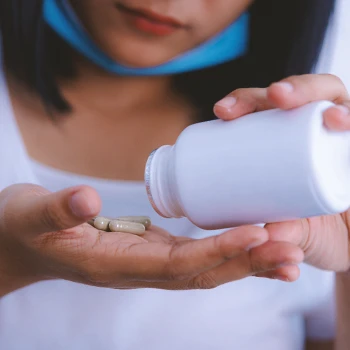
When exploring ADHD medication alternatives, don't just eye the ingredient dosages.
Sometimes, higher doses boost cognitive health, but often, it's the formula that counts. A mix of lower-dosed ingredients can pack a bigger punch for ADHD.
That's why our dietitian and doctor scrutinized the nutritional content of our tested products, pinpointing those with solid scientific backing.
Top of the list? Mind Lab Pro. Every ingredient in it is backed by reliable research.
The Role of Diet and Nutrition in Managing ADHD
As a foodie with ADHD, I discovered how diet dramatically affects my symptoms. A balanced diet, combined with nootropics, not only boosts cognitive benefits but also overall well-being.
Nutrients like omega-3s, zinc, magnesium, and vitamin B6 can lessen hyperactivity and sharpen focus [20].
Eating whole foods - fruits, veggies, lean proteins, and complex carbs - provides key nutrients and stabilizes blood sugar.
Together with nootropics, this duo enhances cognitive function and impulse control in ADHD. But remember, it's key to chat with a healthcare pro to customize your diet and nootropic choices.
Behavioral Therapies and Interventions for ADHD
Behavioral therapies, alongside nootropics, are key in managing ADHD. They boost self-control, focus, and organization.
Cognitive-behavioral therapy (CBT) hones coping and problem-solving skills. Parent training and family therapy support both the individual and their family. Tailored academic plans cater to specific learning needs.
Mindfulness and meditation also help sharpen attention and regulate emotions. Together with nootropics, this all-around approach effectively tackles ADHD symptoms.
Impact of Physical Activity on ADHD
Regular exercise greatly eases ADHD symptoms, boosting focus and brain function.
It ramps up neurotransmitters like dopamine and norepinephrine, key for attention and control, while dialing down stress hormones that worsen ADHD [21].
Physical activity also improves sleep, crucial for brain health, and redirects hyperactivity into positive energy.
A steady exercise routine, alongside other ADHD strategies, significantly sharpens attention, focus, and cognitive prowess.
FAQs
What Chemicals Do ADHD Brains Lack?
ADHD brains typically lack a neurotransmitter called norepinephrine. This can significantly impact cognitive performance and the ability to remain focused on a single task at a time.
Is ADHD Just Low Dopamine?
No, ADHD isn’t just due to low dopamine levels. While this neurotransmitter has a huge impact on mental health issues like ADHD, anxiety, and depression, in the case of ADHD, it’s usually a combination of dopamine and norepinephrine that are the problem.
Are Nootropics Ethical?
Nootropics can be ethical, but it hinges on their purpose (medical vs. enhancement), safety and regulation, issues of access and equity, unknown long-term effects, and informed consent. Using them for cognitive enhancement in competitive settings raises questions about fairness, while concerns about safety and unequal access also play significant roles in the ethical debate.
Do Nootropics Help with Stress?
Yes, some nootropics can help with stress, particularly those with adaptogenic properties like Ashwagandha and Rhodiola Rosea, which are known to reduce stress and improve mental resilience.
Our Verdict on the Best Nootropics for ADHD
Attention deficit hyperactivity disorder is not just something that affects children, as many adults struggle with mild versions of it.
Improving your cognitive function with natural or synthetic supplements can be a great solution.
Out of the best nootropics for ADHD that we tested, Mind Lab Pro is the one that yielded the most promising test results.
Our data shows that it can significantly help you with focus and motivation, and in mild ADHD cases, it can help you avoid ADHD medication.
Unless you’re on medication, order your first supply today and see how much it can help.
Our #1 Recommendation
Mind Lab Pro (Best Overall)
Rated With Total Shape's Scoring System
- Has a calming effect on the mind to reduce stress
- Effectively focuses your brain on one task at a time with fewer distractions
- There are no stimulants to make you jittery
- The capsules are easy to swallow for more flexibility when you take them
- Get the BEST PRICE until the end of April
- Only for sale on the official website, with no store purchase options available
About The Author
You May Also Like

